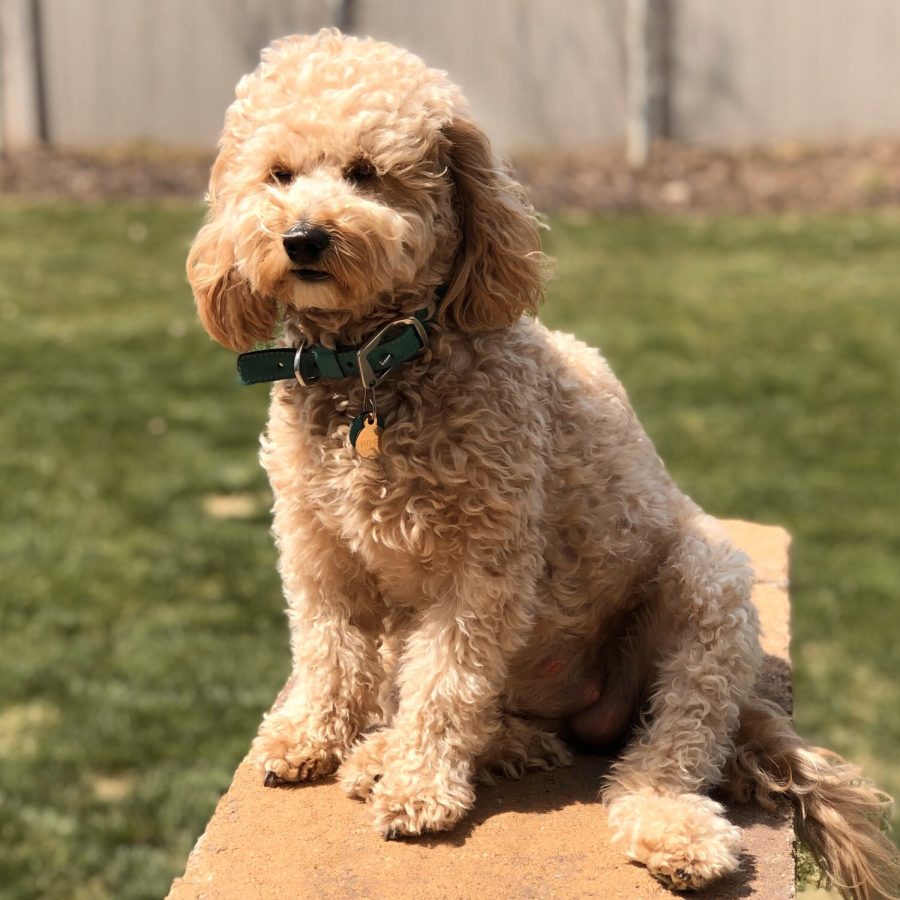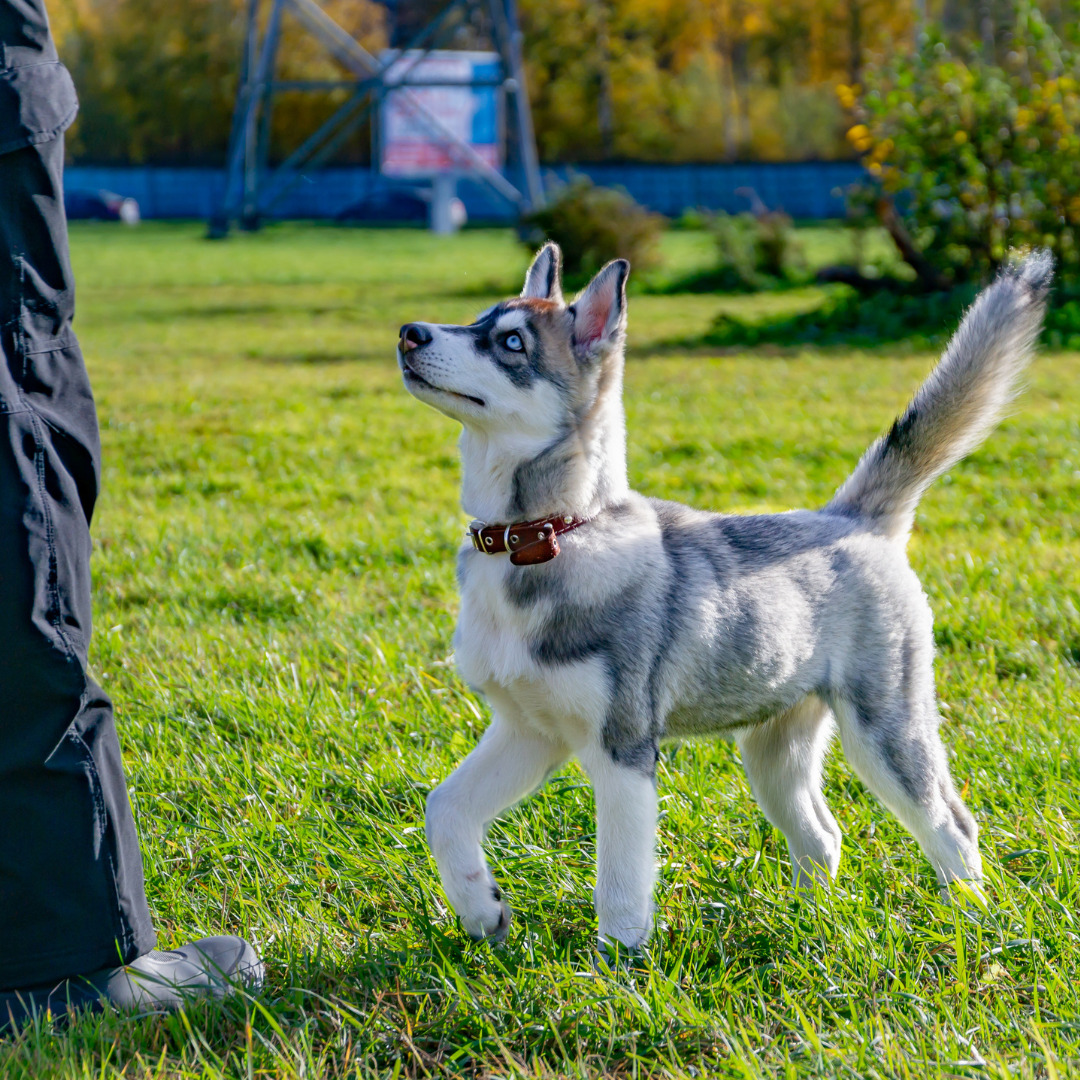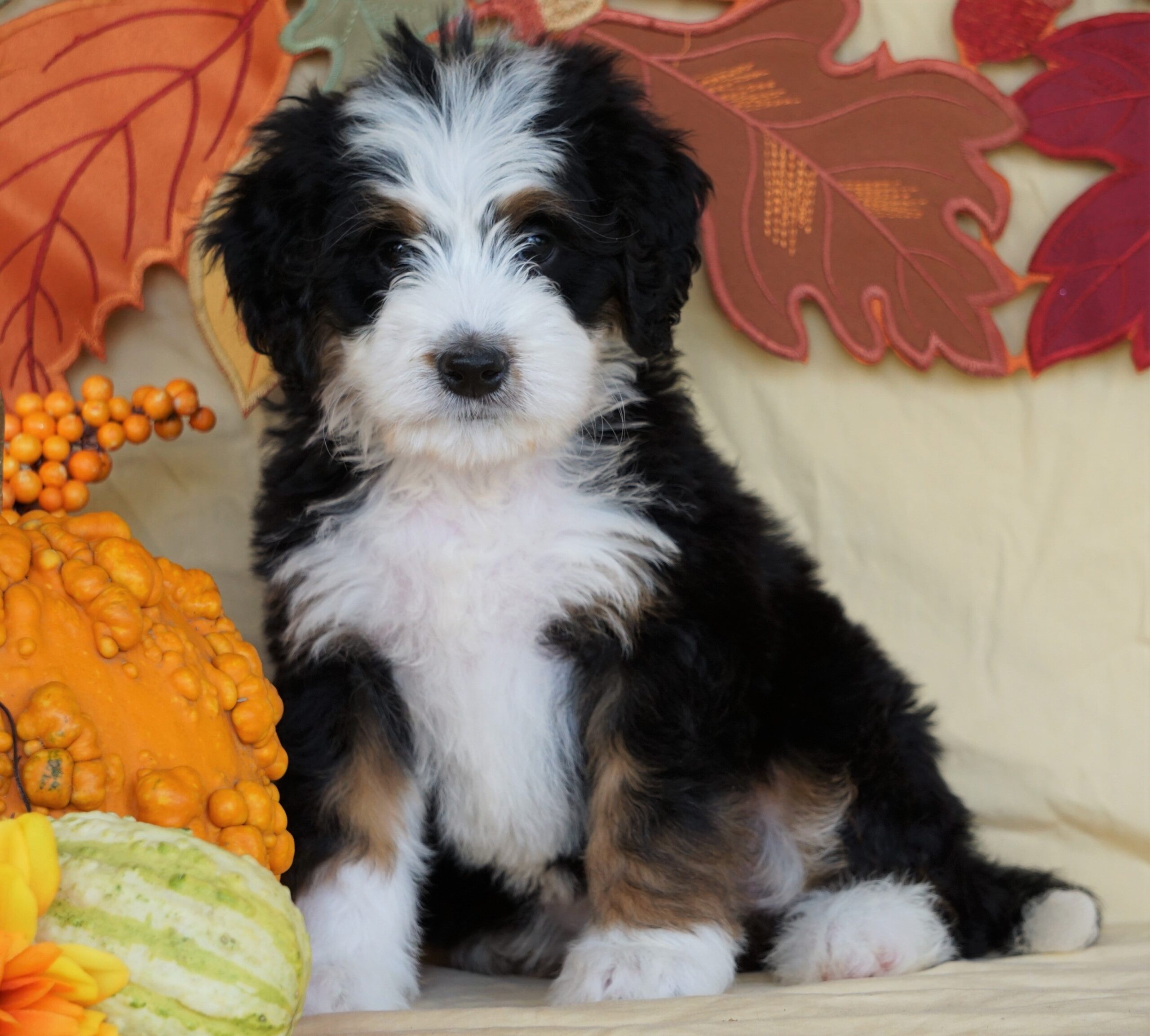Mini Goldendoodles are a sought-after crossbreed, a mix of Miniature Poodles and Golden Retrievers. They stand around 13 to 20 inches tall and weigh 15 to 40 pounds, sporting coats ranging from light cream to auburn red. These dogs are known for their friendly nature and teddy-bear appearance. Regular grooming, exercise, and socialization are key to their well-being. They can be prone to health conditions like Patellar Luxation and Von Willebrand’s Disease. To learn more about their history, health risks, and temperament, explore further details.
Health Considerations for Mini Goldendoodles
When considering the health of Mini Goldendoodles, it is essential to be aware of potential inherited conditions and common health risks that may affect this beloved crossbreed.
Mini Goldendoodles, a mix of Golden Retrievers and Poodles, are prone to several health issues. Inherited conditions such as Patellar Luxation, Von Willebrand’s Disease, Hypothyroidism, Progressive Retinal Atrophy (PRA), and Bloat are prevalent in this breed.
Patellar Luxation, affecting the kneecap, often requires surgical intervention for correction. Von Willebrand’s Disease is a genetic bleeding disorder that can be managed but has no cure. Hypothyroidism, an underactive thyroid condition, is treatable but requires lifelong management. PRA, a hereditary eye disease, can lead to blindness if not monitored. Bloat, a life-threatening condition where the stomach twists, requires immediate veterinary attention.
Owners of Mini Goldendoodles should be vigilant about these potential health risks and consider appropriate preventive measures, including regular vet check-ups and a balanced diet to ensure the well-being of their furry companions.
History of Mini Goldendoodle Breed
The development of the Mini Goldendoodle breed traces back to the intentional crossbreeding of Miniature Poodles and Golden Retrievers. This deliberate combination aimed to create a dog with the desirable traits of both parent breeds, resulting in a unique hybrid known for its intelligence and gentleness.
Key Points:
- Mini Goldendoodles are a deliberate mix of Miniature Poodles and Golden Retrievers.
- The breed inherits traits like intelligence and gentleness from its parent breeds.
- The intentional crossbreeding aimed to create a dog with the best qualities of both Miniature Poodles and Golden Retrievers.
Appearance of Mini Goldendoodles
The defining characteristics that shape the physical appearance of Mini Goldendoodles stem from their unique blend of Miniature Poodle and Golden Retriever traits. These charming dogs typically stand between 13 to 20 inches tall and weigh around 15 to 40 pounds. Their coat, ranging from light cream to auburn red, can be wavy or curly, often inheriting the low-shedding quality from their Poodle lineage.
Mini Goldendoodles exhibit a variety of coat colors and patterns influenced by their parental genes, including solid colors or combinations like Merle, Phantom, and tri-colored variations. Known for their teddy-bear appearance, these dogs have a playful and outgoing demeanor, making them perfect family pets. Their size, intelligence, and friendly nature contribute to their popularity among owners.
With proper grooming, exercise, and socialization, Mini Goldendoodles thrive in various living environments, adapting well to smaller homes and apartment living while bringing joy and companionship to their families.
Maintaining Mini Goldendoodle Breed
To ensure the longevity and well-being of Mini Goldendoodles, maintaining this beloved breed involves consistent grooming, exercise, and socialization practices.
- Regular Grooming: Mini Goldendoodles have coats that range from wavy to curly, requiring regular brushing to prevent matting and maintain their appearance.
- Daily Exercise: These energetic dogs need daily physical activity to stay healthy and prevent boredom-related behaviors.
- Socialization: Mini Goldendoodles are social and thrive on interactions with humans and other dogs, making socialization crucial for their overall well-being.
Health Risks Associated with Mini Goldendoodles
Uncovering potential health risks inherent in Mini Goldendoodles is imperative for responsible ownership and proactive care. Mini Goldendoodles, like any other breed, are susceptible to certain inherited conditions that owners should be aware of. These health risks include Patellar Luxation, Von Willebrand’s Disease, Hypothyroidism, Progressive Retinal Atrophy (PRA), and Gastric Dilation Volvulus (GDV) or Bloat.
These conditions can impact the well-being of Mini Goldendoodles and may require specific treatments or management strategies. For instance, Patellar Luxation often necessitates surgical intervention, while Von Willebrand’s Disease is a bleeding disorder that requires careful monitoring and sometimes medication. Additionally, Hypothyroidism can be managed with medication, but it requires ongoing veterinary attention. Progressive Retinal Atrophy can lead to blindness and needs to be monitored regularly. Gastric Dilation Volvulus is a life-threatening condition that requires immediate veterinary care.
Understanding these potential health risks and being proactive in monitoring and addressing them can help ensure the long-term health and well-being of Mini Goldendoodles.
Common Health Issues Include
In light of the inherent health risks associated with Mini Goldendoodles, it is important to address the common health issues that owners should be vigilant about. While these adorable dogs make wonderful companions, being aware of potential health concerns can help in providing them with the best care possible.
Some common health issues to watch out for include:
- Patellar Luxation: A condition common in both Golden Retrievers and Poodles, where the kneecap dislocates and may require surgical intervention.
- Von Willebrands Disease: An inherited bleeding disorder that can affect Mini Goldendoodles, necessitating careful management as there is no cure.
- Hypothyroidism: Caused by an underactive thyroid gland, this condition is treatable but requires lifelong care and monitoring to ensure the dog’s well-being.
Regular veterinary check-ups, a balanced diet, and appropriate exercise can all contribute to maintaining the health and happiness of your Mini Goldendoodle.
Patellar Luxation
Patellar Luxation, a common condition in both Golden Retrievers and Poodles, affects the knee joint by causing the kneecap to dislocate. This condition can also be found in Mini Goldendoodles due to their genetic makeup. The dislocation of the kneecap can range from mild to severe and may cause intermittent lameness or an abnormal gait. Patellar Luxation is typically diagnosed through a physical examination by a veterinarian. In more severe cases, surgery may be required to correct the issue and improve the dog’s mobility and comfort.
It is essential for Mini Goldendoodle owners to be aware of the signs of Patellar Luxation, such as limping, reluctance to put weight on the affected leg, or a noticeable popping or skipping motion in the joint. Regular veterinary check-ups and monitoring of your dog’s mobility can help in early detection and management of this condition. By staying informed and proactive, owners can ensure their Mini Goldendoodle leads a happy and healthy life free from the discomforts of Patellar Luxation.
Von Willebrands Disease
Von Willebrand’s Disease, a hereditary bleeding disorder, poses potential health risks for Mini Goldendoodles due to their genetic predisposition. This condition affects the blood’s ability to clot properly, leading to excessive bleeding even from minor injuries. It is crucial for Mini Goldendoodle owners to be aware of this disease to ensure early detection and management.
- Von Willebrand’s Disease is an inherited disorder that affects the blood’s clotting ability.
- Symptoms may include excessive bleeding from minor cuts or surgeries.
- Regular veterinary check-ups and blood tests can help in diagnosing and managing this condition effectively.
Hypothyroidism
Hypothyroidism is a common health condition that Mini Goldendoodles may experience, affecting their thyroid function. This condition arises when the thyroid gland does not produce enough thyroid hormone, resulting in various symptoms such as weight gain, lethargy, hair loss, and skin issues.
Mini Goldendoodles with hypothyroidism may exhibit a decrease in energy levels, changes in coat quality, and potential weight fluctuations.
Diagnosis of hypothyroidism in Mini Goldendoodles involves blood tests to measure thyroid hormone levels. Treatment typically includes daily medication to supplement the thyroid hormone deficiency and manage the symptoms effectively.
With proper medication and monitoring, Mini Goldendoodles with hypothyroidism can lead normal, healthy lives. Regular veterinary check-ups and adherence to medication schedules are crucial to ensure the well-being of Mini Goldendoodles affected by this condition.
Owners should be vigilant for any signs of hypothyroidism and consult their veterinarian promptly if they suspect their pet is experiencing symptoms.
Progressive Retinal Atrophy (PRA)
The impact of Progressive Retinal Atrophy (PRA) on the vision of Mini Goldendoodles is significant. PRA is a hereditary eye condition that gradually leads to blindness by causing the degeneration of the retina over time. Initially, symptoms may not be noticeable, but as the disease progresses, dogs may experience night blindness, decreased vision in dim light, and ultimately complete blindness.
PRA is a genetic disease that Mini Goldendoodles can inherit from their parents. Regular eye check-ups are essential to monitor the progression of PRA. Unfortunately, there is currently no cure for PRA. However, early detection through genetic testing can help in managing the condition and adapting the living environment to support a visually impaired dog.
Gastric Dilation Volvulus (GDV) or Bloat
Gastric Dilation Volvulus (GDV), commonly known as Bloat, is a life-threatening condition that can affect Mini Goldendoodles. GDV occurs when a dog’s stomach fills with gas or fluid, causing it to twist on itself, cutting off blood flow. This emergency situation requires immediate veterinary attention to prevent shock, organ damage, or even death. Signs of GDV include restlessness, bloated abdomen, unproductive vomiting, and rapid breathing.
To further understand the severity and implications of GDV in Mini Goldendoodles, the following table outlines key points:
| GDV/Bloat in Mini Goldendoodles | |
|---|---|
| Causes | Stomach twisting, gas buildup |
| Symptoms | Restlessness, bloating, unproductive vomiting |
| Treatment | Emergency surgery to untwist the stomach |
| Prevention | Feeding multiple small meals, avoiding exercise after eating |
| Prognosis | Prompt treatment crucial for a successful outcome |
Choosing the Best Diet for Mini Goldendoodles
When considering the dietary needs of Mini Goldendoodles, it is essential to prioritize balanced nutrition to support their overall health and well-being.
- Quality Ingredients: Opt for dog foods containing high-quality proteins, essential vitamins, and minerals to meet their dietary requirements.
- Avoid Fillers: Steer clear of foods with excessive fillers like corn, wheat, and soy, which may lead to digestive issues and allergies.
- Consult Your Vet: Seek guidance from your veterinarian to determine the best diet plan tailored to your Mini Goldendoodle’s specific needs, taking into account factors like age, weight, and activity level.
Temperament of Mini Goldendoodles
The temperament of Mini Goldendoodles is characterized by their affectionate and playful nature, making them well-suited for families seeking a loving companion with a gentle disposition. These dogs are known for being good with children, displaying a friendly and sociable demeanor towards both people and other animals. While they are not typically aggressive, like any dog, they may exhibit teething behaviors during their puppy stage.
Mini Goldendoodles are intelligent and easy to train, responding well to positive reinforcement methods and engaging training sessions. However, their high intelligence can sometimes lead to mischief, emphasizing the importance of mental stimulation to prevent behavioral issues.
In terms of care and maintenance, socialization, daily exercise, and involvement in family activities are essential for the well-being of Mini Goldendoodles. Their grooming needs are moderate, requiring regular brushing to maintain their coat’s health and appearance. By providing a loving environment, proper training, and fulfilling their exercise needs, Mini Goldendoodles can thrive as loyal and affectionate companions in a variety of family settings.
Food Consumption of Mini Goldendoodles
An essential aspect of caring for Mini Goldendoodles involves ensuring appropriate food consumption to maintain their health and well-being. When it comes to feeding your Mini Goldendoodle, consider the following:
- Balanced Nutrition: Provide a well-balanced diet that meets the nutritional needs of your Mini Goldendoodle, including proteins, carbohydrates, fats, vitamins, and minerals.
- Portion Control: Monitor the portion sizes to prevent overeating and obesity, which can lead to health issues.
- Consultation with Veterinarian: Consult your veterinarian to determine the best diet plan suited for your Mini Goldendoodle’s age, size, activity level, and any specific health concerns.
Height & Weight of Mini Goldendoodles
In understanding the physical characteristics of Mini Goldendoodles, it is pertinent to consider their height and weight range as key indicators of their breed standard. Mini Goldendoodles typically stand between 13 to 20 inches tall at the shoulder and weigh anywhere from 15 to 40 pounds. These ranges can vary slightly depending on the specific breeding lineage and individual genetics within the Mini Goldendoodle population. The height and weight of Mini Goldendoodles make them a compact and manageable size for families and individuals living in various types of homes, including apartments or houses with limited space.
The variation in size within the Mini Goldendoodle breed allows for flexibility in accommodating different lifestyles and living situations. Despite their smaller stature compared to standard Goldendoodles, Mini Goldendoodles retain the intelligence, sociability, and energy levels that make them beloved companions. Proper nutrition, exercise, and regular veterinary care are essential to ensure these dogs maintain a healthy weight and overall well-being throughout their lifespan.
Experiences of Mini Goldendoodle Owners
Among those who have embraced the companionship of Mini Goldendoodles, insights into the ownership experience reveal a blend of joy, challenges, and fulfillment.
- Unwavering Companionship: Mini Goldendoodle owners often attest to the unwavering loyalty and companionship these dogs provide, becoming integral members of the family dynamic.
- Energetic Playmates: Owners frequently highlight the playful and energetic nature of Mini Goldendoodles, emphasizing the joy they bring through their enthusiasm for play and interaction.
- Training and Socialization: Many owners find fulfillment in the training and socialization journey with their Mini Goldendoodles, witnessing their intelligence and adaptability in learning new commands and behaviors.
These shared experiences underscore the unique bond formed between Mini Goldendoodle owners and their beloved pets, characterized by mutual love, growth, and shared adventures.
Conclusion
In conclusion, Mini Goldendoodles are a unique and popular dog breed known for their low-shedding coats, social intelligence, and appealing appearance. Understanding their health considerations, history, appearance, maintenance, health risks, temperament, food consumption, and size is crucial for prospective owners.
By being aware of these aspects, individuals can provide the necessary care and attention to ensure a fulfilling relationship with their Mini Goldendoodle companions.



